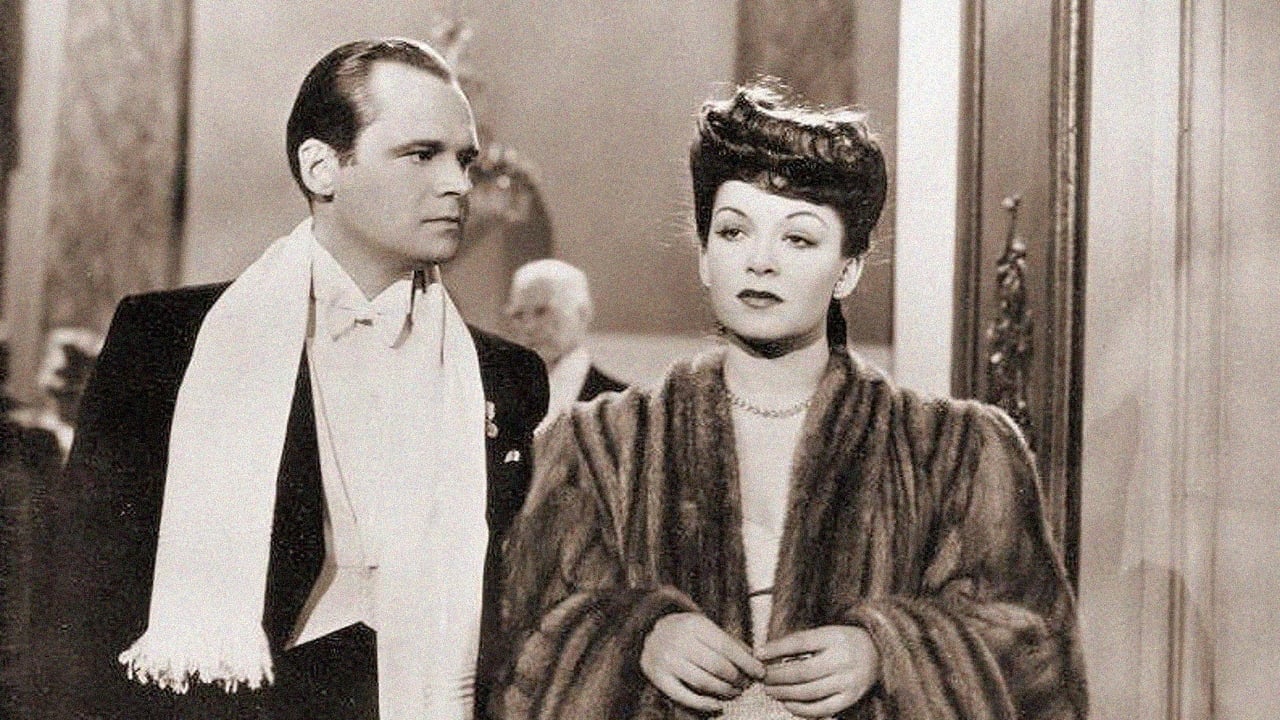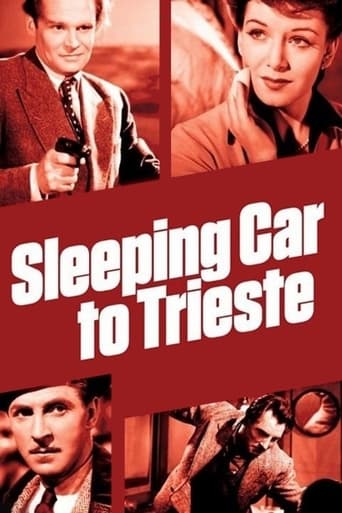


Fantastic!
... View MoreDisappointment for a huge fan!
... View MoreIt is not only a funny movie, but it allows a great amount of joy for anyone who watches it.
... View MoreBlending excellent reporting and strong storytelling, this is a disturbing film truly stranger than fiction
... View MoreThis is a remake of 1932's Rome Express, which is a far better film and stars the seedy and sinister Mr Dane Calthrop. This version is slow and plodding, and the humour is mainly heavy handed. There is an unnecessary subplot about an Englishman trying to explain English cookery to a French chef (I'm not going back to the Good Old Days - I remember that food).Best things about this version are David Tomlinson as the old schoolfriend who turns up inappositely, and Hugh Burden as the put-upon secretary. The McGuffin is a diary containing secrets that might start a war with an unspecified country, rather than a stolen painting. The adulterous couple are sexless as only the English can be. Jean Kent is always worth watching, but whoever designed her frumpy wardrobe should be condemned to selling long underwear in British Home Stores. That hat with the two horns - or are they ice cream cones? There is a subplot about two French girls who are smuggling model hats, and they are rather good, as is Bonar Colleano as a wisecracking American soldier. His wisecracks really are funny. His mate the birdwatcher is good, too.But overall - it's as stodgy as an English suet pudding.
... View MoreSLEEPING CAR TO TRIESTE is a post-war thriller set on board a train in which various spies and interested political parties attempt to get their hands on a precious stolen diary. After a slow first hour which is all set-up, the story gets quite interesting and throws some thrillery-type thrills into the mix. The cast isn't bad, including the familiar likes of Hugh Burden, David Tomlinson, and Finlay Currie in the mix, and things build to an effective 'who's the bad guy?' twist climax. It's not one of the most exciting films ever made, but it does the job well enough.
... View MoreThis is a rattling good post-war thriller.It features customs duty evasion, adultery, espionage, murder, robbery in fact the screen writers attempted to include almost all the major crimes in their script (apart from sex crimes which were denied by the prevailing film code on film producers).The film is mainly played out on the romantic "Orient Express" with an international cast as it journeys from Paris-Simplon-Venice-Trieste across the Continent of Western Europe.Trains are a favourite location for thriller writers and several famous films were made with them as a backdrop: "The 39 Steps" (1935), "The Lady Vanishes" (1938), and "Night Train to Munich" (1940) all of which I can recommend to 1940s film buffs.I have quite a few films from the 1940s, my favourite era.If fans want to see the principal players from "Sleeping Car to Trieste" cast in leading roles, they should attempt to obtain the following films: Derrick de Marney - George Grant, a younger actor in Hitchcock's "Young & Innocent" (1937), Jean Kent - Valya, still playing rather sadistic roles in "The Browning Version" (1951), Albert Lieven - Zarta, more sympathetic as a portrait painter in "The Seventh Veil" (1945), Paul Depuis - Det.Insp. Jolif, a French Aristocrat in "Madness of the Heart" (1949) & "Passport to Pimlico" (1949), Bonar Colleano - Sgt. West, virtually playing the same role in "The Way to the Stars" (1945), Finalay Currie - Alistair MacBain, such a versatile actor, try the convict in "Great Expectations" (1946) with John Mills, David Tomlinson - Tom Bishop, his best role was as one of the "Three Men in a Boat" (1953).Finally, Alan Wheatley is indelibly imprinted on my memory as the dastardly Sheriff of Nottingham in the 1950s British TV series "The Adventures of Robin Hood" starring Richard Green.The plot without spoilers has already been indicated by other reviewers so I will restrict my comments on the acting.In the main it was very creditable and it has an interesting mix of international stars.The action never lets up but with the 1940s moral code in place, you know the guilty must eventually receive their comeuppance.In todays politically correct climate I am always fascinated by how often actors in these 1940s films light up and drink copious quantities of Scotch.It makes a refreshing change and reminds me of my youth when steam was the norm on railways.I rated it 6/10.P.S. I was born in 1946.
... View MoreThere is something about trains as a setting for crime, espionage, and mystery. Agatha Christie used it in several of her stories, the most notable being turned into the film "Murder On The Orient Express". Other choice examples include Hitchcock's "The Lady Vanishes", Carol Reed's "Night Train To Munich", "The Great Train Robbery" (with Sean Connery), and "Break Heart Pass". The historical settings of some of these stories dim any possible contemporary relevance from when they were made, but some of them remind us of the latter. Hitchcock and Reed's films were definitely aimed at the threat of Nazi Germany. And this film, "Sleeping Car to Trieste" was definitely set in post - 1945 Europe, and hinted (somewhat broadly) at what was the country that the train's hidden cargo was aimed at.Albert Lieven and Jean Kent are foreign agents who steal a valuable diary from an embassy in Paris. Allan Wheatley is an accomplice, to whom the diary is passed by Lieven. But two unexpected problems arise. First, Lieven had to kill a servant in the embassy to complete the theft of the diary and get away. Secondly Wheatley has doubled crossed his partners, and is fleeing (via the Orient Express) to sell the diary for a large sum of money. Lieven and Kent soon have found out where to find Wheatley, and pursue him. However, they are soon involved with not only tracking down Wheatley (who is hiding out in a train compartment) but with an adulterous couple, an idiot friend (David Tomlinson) of the man in the adulterous couple relationship, a wealthy, autocratic writer (Finley Currie) and his beaten down secretary, a bird watcher, a French police inspector, and the train's cook (Gregoire Aslan) who is going through a purgatory listening to a cooking "efficiency" expert from England who knows nothing about making edible food. The film follows the twists and turns until the showdown moment when Lieven and Kent may get the stolen diary back or not.I'm not a spoiler so I won't ruin the conclusion for viewers (who won't be disappointed). My concern here is what is the historical edge to when the film was made (1948). Lieven and Kent are from an Eastern European country, and Lieven cannot get into the country for some political reason (which Wheatley is counting on). But the diary would (if published) hurt the current regime (although it might cause another European War). What is this country, and why does it seem in the interest of the west (represented by the French inspector) for them to retrieve the stolen diary? Obviously the answer is the setting in the title: "Sleeping Car to Trieste". "Trieste", the last "western" European city/stop on the Orient Express, is on the border of Italy and Yugoslavia. In 1948 Yugoslavia was one of the Communist states set up by Russia following the end of World War II. But that year, it was becoming apparent to England and France (and the U.S.) that Yugoslavia was not going to be a robot creation of the U.S.S.R. Under Tito that country was struggling to practice socialist doctrine but not to automatically jump to Russian demands. As Yugoslavia is mountainous, and far from Russia, it could get away with this. But Yugoslavia was made up of six or seven nations, and if they were set at each other's throats the system would collapse. It was to the interest of the west to help (quietly) prop up Tito.It fits into the plot on several levels. Lieven held military rank in the country prior to 1945. He must have been an officer in the Chetnik forces that Tito and his partisans defeated and decimated. He has no love for that regime, and if the published diary destroys it all to the good (and who cares about the European consequences - Yugoslavia, the creation of the Serbs after World War I, was built from the ruins of 1914 Europe due to the Serbian assassination of Franz Ferdinand). The country that resulted, though, was really a difficult balancing act (note how quickly it has collapsed in the years since Tito died in the 1980s). As Finley Currie comments in the film it is a crack-pot country, as opposed to say France, Spain, England, or Holland. This is actually wrong. Conflicting nationalist movements bother France, Spain, and England to this day - it's just that the people seem more homogeneous on the surface. But Currie, supposedly a world peace advocate but actually a blow-hard, has been insulted by being denied entrance to Yugoslavia by the government. He is venting his frustration with his comment. The movie flows very quickly, and is a solid entertainment. As such I recommend seeing it to anyone who wants to see a good film of intrigue.
... View More